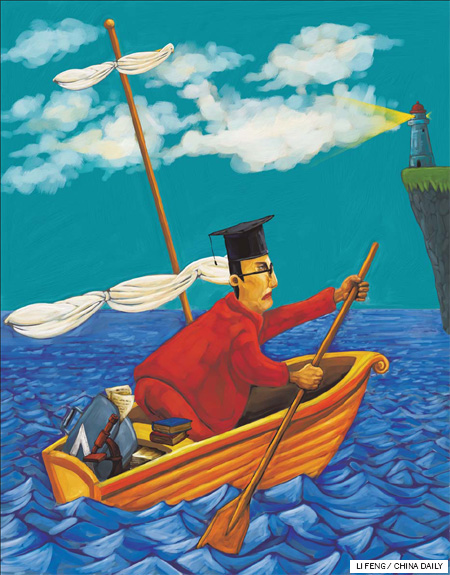
After 16 years as a scientist at one of Britain's top laboratories, Cui Zheng was to get a little bored with just publishing papers in science journals. He wanted to be at the heart of the action - in China.
The 55-year-old was among the most respected scientists at the Rutherford Appleton Laboratory in England, yet the lure of getting more practical experience in his homeland proved too strong.
"I like practical research and I have always wanted to do something about the application of my technologies," said Cui, a leading expert in nanofabrication technology. "I thought it would be easier for me to do that in China."
Cui returned last October as part of the Thousand Talents program - a government project to attract experts from overseas - and is finally getting hands-on experience as a researcher at the Chinese Academy of Sciences' institute of nanotechnology and nanobiotics.
"I'd have probably waited longer to look for other opportunities to return were it not for the program. It provides a more privileged position than programs before it," said the scientist now based in Suzhou, Jiangsu province.
Launched in 2008, the Thousand Talents program targets Chinese and foreign academics working at the world's best institutions or as entrepreneurs. "These high-end talents are a crucial resource that the country is short of," said Li Yuanchao, member of the Political Bureau of the Central Committee of the Communist Party of China, in Shanghai in April last year.
More than 600 people, mostly Chinese, have already signed up. They all lead or are about to lead research teams at Chinese universities, laboratories, State-owned enterprises and science parks, or setting up their own businesses.
Each new recruit receives 1 million yuan ($146,000) from the central government, as well as funding from their employers. The Chinese Academy of Sciences promises to allocate 10 million yuan to every talent.
"These experts are now an elite class in China's academic system," said Li Keping, a professor of railway transportation at Beijing Jiaotong University. "Most of them are in management positions and some of them will become academicians. Their arrival (at an institution) often leads to a reshuffle (of staff)."
Although this has not been popular with some, Rao Yi, who returned from the United States to become dean of Peking University's school of life sciences in April 2009, said he believes the influx of talent is bringing fundamental changes to the nation's academic scene.
"There are three major things senior scientists recruited for China can do," said the former tenured professor of neuroscience at Northwestern University in Chicago. "They can do good science, either making significant discoveries or being highly productive; they can provide environments that allow young scientists to prosper, and they can help change Chinese academia through their collective effort."
Rao, 48, is now overseeing a series of reforms at the Beijing school, from teaching to research and management.
Shi Yigong is also busy making changes and has been doing some recruiting of his own since he left Princeton University in New Jersey 12 months ago to become associate dean of the school of life sciences at Tsinghua University.
In a letter to the Chinese Biological Investigators' Society in the US last year, the professor wrote proudly: "I have spent most of my administrative time on faculty recruitment. We interviewed more than 60 candidates and made approximately 29 offers. Twenty-two of the 29 selected candidates accepted Tsinghua's offer and 15 have already established independent laboratories here."


